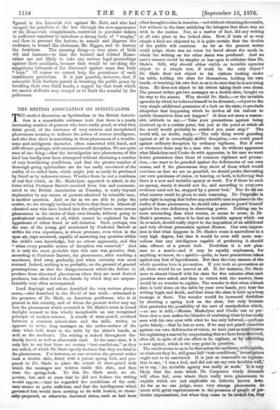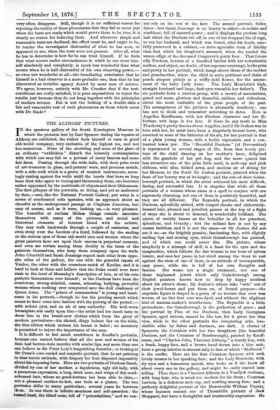THE BRITISH ASSOCIATION ON SPIRITUALISM.
THE excited discussion on Spiritualism in the British Associa- tion is a remarkable evidence both that there is a yearly increasing number of persons who have really proof, or what they think proof, of the existence of very curious and unexplained phenomena seeming to indicate the action of unseen intelligence, and also that there is something in these phenomena of a trouble- some and ambiguous character, often connected with fraud, and still oftener, perhaps, with unconscious self-deception. We are quite sure of one thing,—that the investigation into phenomena of this kind has harffirever been attempted without disclosing a number of very bewildering conditions, and that the greater number of thorough-going spiritualists are far too easily convinced of the reality of so-called facts, which might just as easily be prOduced by fraud as by unknown causes. Whether there be not a residuum of real fact which, as Mr. Maskelyne appeared to admit, in the letter which Professor Barrett received from him and communi- cated to the British Association on Tuesday, is really beyond explanation by any causes at present admitted by scientific men, is another question. And so far as we are able to judge the matter, we are strongly inclined to believe that there is. Almost all educated men who have looked into the subject have come across phenomena in the circles of their own friends, without going to professional mediums at all, which cannot be explained by the hypothesis of either fraud or self -delusion. Such, perhaps, was the case of the young girl mentioned by Professor Barrett as within his own experience, in whose presence, even when in the open air, raps occurred, capable of answering any question within the child's own knowledge, but no others apparently, and this "when every possible source of deception was removed." And it is only the more probable that this case was genuine, that, according to Professor Barrett, the phenomena, after reaching a maximum, died away gradually, just when curiosity was most aroused. Indeed, nothing is so probable, on the ground of general presumptions, as that the disappointment which the failure to produce these abnormal phenomena when they are most desired produces, has often led to the frauds by which they are unques- tionably very often accompanied.
Lord Rayleigh and others described the very curious pheno- mena,—also described in the World of last week,—witnessed in the presence of Dr. Slade, an American gentleman, who is at present in this country, and of whom the present writer may say that the phenomena which occurred in Dr. Slade's room in broad daylight seemed to him wholly inexplicable on any recognised principle of modern science. A crumb of slate-pencil, confined between a common school-slate and the table, writes, or appears to write, long messages on the under-surface of the slate when held down to the table by the sitter's. hands, as well as the medium's. The writing is indeed throughout dis- tinctly heard, as well as afterwards read. At the same time, it is only fair to say that there are certain "test-conditions," as they are called, of which Dr. Slade openly declares that they are fatal to the phenomena. For instance, on one occasion the present writer took a double slate, fitted with a patent spring lock, and pro- posed to Dr. Slade to place the crumb of slate-pencil with which the messages are written inside this slate, and then close the spring-lock. To this Dr. Slade made no ob- jection, but said at once that he did not believe the writing would appear,—that he regarded the conditions of the ordi- nary seance as quite sufficient, and that the intelligences which governed him would have nothing to do with locked, or chemi- cally-prepared, or otherwise doctored slates, such as had been often brought to him in America, —not without obtaining th e results, but without in the least satisfying the bringers that there was no trick in the matter. Nor, as a matter of fact, did any writing at all take place in the locked slate. Now, if testa of so very simple a kind are objected to, it is quite certain that the doubts of the public will continue. As far as the present writer could judge, there was no room for fraud about the mode in which the writing on the other slates was produced And no man's manner could be simpler or less open to criticism than Dr. Slade's. Still, why should either visible or invisible agencies object to a simple test, if truth be the only object? Dr. Slade does' not object to his visitors looking under his table, holding the slate for themselves, holding his own hands, or touching his own feet seas to be sure that he is not using them. He does not object to his sitters taking their own slates. The present writer got two messages on a double slate, bought on his way to the séance. Why should Dr. Slade,—or the invisible agencies by which he believes himself to be directed,—object to the very simple additional guarantee of a lock on the slate, to preclude altogether that happening which he invites all his visitors to satisfy themselves does not happen? it does not seem a reason- able attitude to say,-4 Take your precautions against being deceived up to a certain point, but just at the point at which all the world would probably be satisfied you must stop ?' The world will, no doubt, reply,—' The only thing worth guarding against at all is exceedingly skilful deception,—we could guard against ordinary deception by ordinary vigilance. But if ever or whenever there may be a man who can do without apparatus what Maskelyne and Cooke do with apparatus, in his Case we want better guarantees than those of common vigilance and precau- tion,—we want to be guarded against the deficiencies of our own senses, and if the phenomena stop short of those which would convince UE that we are so guarded, we should prefer distrusting our own quickness of vision, or hearing, or both, to believing that there is a new and invisible agency at work. For if there be such an agency, surely it should not be, and according to your own evidence need not be, stopped by a patent lock.' Nor do we see what answer could be given to such reasoning. Dr. Carpenter is quite right in saying that before any scientific man acquiesces in the reality of these phenomena, he should take pains to guard himself against his own deficiency in observing power. Nothing can be more astounding than what occurs, or seems to occur, in Dr Slade's presence, unless it be that an invisible agency which can do so much, should really object to the imposition of an additional and very obvious precaution against illusion. Our own impres- sion is that what happens in Dr. Slade's room is marvellous in a very high degree, but that it would be even still more mar- vellous that any intelligence capable of producing it should take offence at a. patent lock. Doubtless it is not plea- sant to a man's—and it may be equally unpleasant, for anything we know, to a spirit's—pride, to have precautions taken against any feat of legerdemain. But then the very essence of the whole question here is precaution. If you took no precaution at all, there would be no marvel at all. If, for instance, Dr. Slade were to absent himself with his slate for five minutes after each question were asked, and then to return with the answer, there would be no wonder to explain. The wonder is that when a blank slate is held down on the table by your own hands, you hear the writing begin and finish, and that when the slate is held up a long message is there. The wonder would be increased doubtless by shutting a spring lock on the slate, but only because that precludes the possibility of the sort of manipulation which, —as one is told,—Messrs. Maskelyne and Cooke can so per- form that a man makes the blunder of confusing what he has really seen with his own eyes with what he has only inferred,—perhaps quite falsely,—that he has so seen. If we may not guard ourselves against our own deficiencies of vision, we have just as much reason for explaining a marvel by conjecturing that we have been deceived, after all, in spite of all our effort to be vigilant, as by admitting a new agency, which is the very point in question.
• The result seems to us to be thatunless the mediums, or the spirits, or whatever they be, will grant full "test-conditions," investigators ought not to be convinced. It is just as reasonable an explana- tion to say, I was a fool, and did not use my own faculties well,' as to say, 'An invisible agency was really at work.' It is very likely that the tests which Dr. Carpenter wisely demands will often fail, even where there really were phenomena to explain which are not explicable on hitherto known laws. As far as we can judge, some very strange phenomena do 'occur with great capriciousness in the presence of people of par- ticular organisations, but when they come to be looked for, they
very often disappear. Still, though it is no sufficient reason for rejecting the reality of these phenomena that they fail to occur just when the testa are ready which would prove them to be true, it is clearly no reason for believing them. And whenever simple and reasonable tests are declined, the effect must be, and ought to be, to render the investigator distrustful of what he has seen, or appeared to see, when the tests were not present. After all, what he has to determine is how far he can trust himself. If he finds that what occurs under circumstances in which he can trust him- self absolutely and completely, is much less wonderful than what occurs when he is half-distrustful of his own observing power,- '-., or even not wonderful at all—the humiliating conclusion that he himself is a bad observer is a more probable one, than that he has discovered an invisible agency denied by most men of science. We agree, however, entirely with Mr. Crookes that if the test- conditions are really satisfied, it is pure superstition to reject the results just because they do not hang together with the principles of modern science. But is not the locking of a double slate a fair and reasonable teat of such phenomena as those which occur with Dr. Slade ?































 Previous page
Previous page